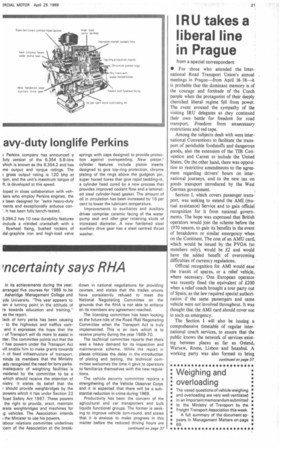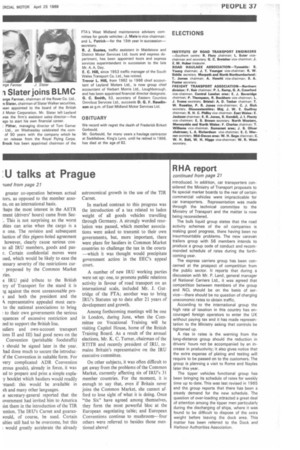I R U takes a liberal line in Prague
Page 23

Page 39

If you've noticed an error in this article please click here to report it so we can fix it.
from a special correspondent
• For those who attended the International Road Transport Union's annual meetings in Prague—from April 16-18—it is probable that the dominant memory is of the courage and fortitude of the Czech people when the protagonist of their deeply cherished liberal regime fell from power. The event aroused the sympathy of the visiting IRU delegates as they continued their own battle for freedom for road transport. Freedom from unnecessary restrictions and red tape.
Among the subjects dealt with were international Conventions to facilitate the transport of perishable foodstuffs and dangerous goods, also the extension of the TIR Convention and Carnet to include the United States. On the other hand, there was opposition to restrictive amendments to the agreement regarding drivers' hours on international journeys, and to the new tax on goods transport introduced by the West German government.
Section I. which covers passenger transport, was seeking to extend the AMI (mutual assistance) Service and to gain official recognition for it from national governments. The hope was expressed that British operators would join the scheme before the 1970 season, to gain its benefits in the event of breakdown or similar emergency when on the Continent. The cost of an AMU card, which would be issued by the PVOA (to members only), would be £2 and would have the added benefit of overcoming difficulties of currency regulations.
Official recognition for AMI would ease the transit of spares, or a relief vehicle, where necessary. One European operator was recently fined the equivalent of £200 when a relief coach brought a tour party out of Spain, as the law required special authorifation if the same passengers and same vehicle were not involved throughout. It was thought that the AMI card .should cover use in such an emergency.
The Section I will also be issuing a comprehensive timetable of regular international coach services, to ensure that the public knows the network of services existing between places as far as Ostend, Warsaw, Rome, Lisbon and Istanbul. A working party was also formed to bring
greater co-operation between actual tors, as opposed to the member assons, on an international basis.
-haps the most interest in the AETR ;ment (drivers' hours) came from Sec. This is not surprising as the worst tides can arise when the cargo is a n one. The revision and subsequent luction of this pigeon-holed agreement however, clearly cause serious conto all IRU members, goods and past-. Certain confidential moves were ;sed, which would be likely to ease the ;essary severity of the restrictions curproposed by the Common Market net.
e IRU paid tribute to the British try of Transport for the stand it is ig against the most unreasonable pros and both the president and the k. representative appealed most earnto the national associations to bring : to their own governments the serious quences of excessive restriction and .wd to support the British line.
millers and own-account transport ions II and III) had good news on the Convention (perishable foodstuffs)
should be signed later in the year. had done much to secure the introduc.4 the Convention in suitable form. For very complicated ADR Convention erous goods), already in force, it was ed to prepare and print a simple explay booklet which hauliers would readily -stand: this would be available in sh and many other languages.
Le secretary-general reported that the overnment had invited him to America sist them in the introduction of the TIR rention. The IRU's Carnet and guaranwould, of course, be used. Certain ulties still had to be overcome, but this ; would greatly accelerate the already astronomical growth in the use of the TIR Carnet.
In marked contrast to this progress was the introduction of a tax related to laden weight of all goods vehicles travelling through Germany. A strongly worded resolution was passed, which member associations were asked to transmit to their own governments, but, more important, there were plans for hauliers in Common Market countries to challenge the tax in the courts —which it was thought would precipitate government action in the EEC's appeal court.
A number of new IRU working parties were set up: one, to promote public relations activity in favour of road transport on an international scale, included Mr. J. Guttridge of the VT A; another was to bring IRU's Statutes up to date after 21 years of development and growth.
Among forthcoming meetings will be one in London, during June, when the Committee on Vocational Training will be visiting Capitol House, home of the British Training Board. As a result of the annual elections, Mr. K. C. Turner, chairman of the RTITB and recently president of IRU, remains Britain's representative on the IRU executive committee.
On other subjects, it was often difficult to get away from the problems of the Common Market, currently affecting six of IRU's 31 member countries_ For the moment, it is enough to say that, even if Britain never joins the Common Market, she cannot afford to lose sight of what it is doing. Once "the Six" have agreed among themselves, they form the most powerful bloc at the European negotiating table; and European Conventions continue to mushroom—four others were referred to besides those mentioned above!
























































































































